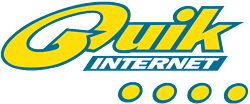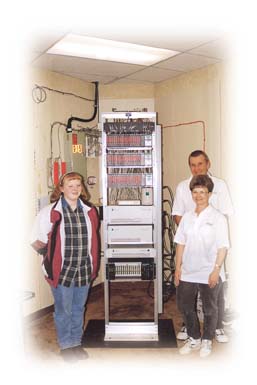Quik International grows global franchise business with Lucent PortMaster 3s
No - they don't sell hamburgers. But Quik International aims to capture a big piece of the $300 billion Internet sales revenue that's projected over the next two years. How? By tapping into the same entrepreneurial spirit that made "the golden arches" popular from Boston to Bangkok. In other words, Quik is in the business of selling Internet service provider (ISP) franchises - all based on Lucent Technologies industry-leading PortMaster® products.

Quik International is already well on the way to realizing its goal. After only two years of operations, Quik International has established more than 50 PortMaster-equipped franchise locations in the continental United States, Canada, El Salvador, Guatemala, and Russia.
Background
"The Internet is a decentralized communications network that is best supported by a decentralized business model," explains Jack Reynolds, president and CEO of Quik International. "Franchising gives entrepreneurs the economies of scale and brand name recognition they need to compete with large centralized service providers like the big phone companies. Service and pricing being equal, people will always do business locally with people they know - which is why our franchise model is the most effective delivery system. We supply the equipment, technical expertise, and training; our franchisees supply the service and support in their own communities."
A visit to Quik International's web site at http://www.quik.com reveals that the start-up cost for any would-be Quik International franchisee is typically about $50,000. The only technical knowledge required is some familiarity with Windows 95. Interested entrepreneurs can easily find out whether they are qualified by completing a simple on-line form at Quik International's web site.
Quik International began operations in January 1996 with a single PortMaster point-of-presence (POP) that Jack Reynolds built in his own garage. The first Quik International franchise opened in July of the same year. Headquartered in Las Vegas, Nevada, the company today owns and operates a nationwide data transmission network that consolidates all Internet traffic from its franchises into central servers in four different Orange County, California, locations.
Quik International's Irvine, California, hub links to three Internet backbone providers - Sprint, BBNPlanet, and UUNET. Connections to remote franchisee locations are provided via Frame Relay from Sprint or WorldCom and T1 lines provided by GTE, PacBell, Nevada Bell, Southwestern Bell, and (in Guatemala) by Guatell.
Challenge
Quik International management has long understood the biggest challenge facing their franchise clients - keeping costs down while simultaneously growing their businesses. That's why the company designed its network to separate server from access traffic. Instead of using the local T1 loop for both server and access traffic, Quik franchises use a separate pool of servers in Irvine. These servers operate independently from the local loop and, thus, significantly improve bandwidth efficiency.
"The resulting savings to our franchise owners," says Reynolds, "is huge. The average annual cost of bandwidth to a Quik franchisee is $18 - a 41 percent savings over what a non-Quik ISP would pay. Our shared server solution yields even greater savings because it reduces by 70 percent the capital equipment expenditure typically needed by a start-up ISP."
 |
Larry and Carol Green of Wichita Falls (Texas) used to be total Internet "greenhorns." Today theirs is one of the fastest-growing Quik International franchises! |
The second biggest challenge to any ISP start-up is acquiring the technical expertise needed to build and maintain an efficient and reliable InterNetworking Systems delivery system. To the uninitiated, the Internet can be a scary place with all of its different routing protocols, server interfaces, and security potholes. Then too, there's always the problem of tracking and billing user access times and services as well as coping with diverse carrier charges.
Quik International meets this challenge by providing its franchisees with an intensive technical and marketing training program and a software package called Cheetah. This software automatically configures and maintains Quik franchisee accounts and services, allowing them to run every part of their business from any browser from any location on the Internet.
The Lucent solution: reliable, scalable, easy-to-manage PortMaster 3s
Since inception, Quik International has used Lucent PortMaster products for both its own corporate InterNetworking Systems infrastructure and its franchise customers. Currently, Quik International has deployed 10 PortMaster 2E Communications Servers and 60 PortMaster 3 InterNetworking Systems Concentrators at more than 50 POPs worldwide. To keep pace with its projected 400 per cent annual growth plan, Quik International has been adding PortMaster 3 units at an average rate of 10 per month. Says Steve Denato, regional sales manager for Lucent distributor Solunet, "We really have to hustle to keep pace with Quik's demands for fast turnaround."
"The PortMaster 3 has been a key factor in the rapid growth of our business," says Griff Hamlin, Quik International's vice president of Technical Services. "It fully supports critical bandwidth management features like MCP [multichassis point-to-point protocol] and the V.90 standard for universal high-speed dial-up. It easily scales to meet our customers' growing demand for new capacity. What's especially important for both us and our franchisees," Hamlin adds, "Lucent PortMasters are far and away the most reliable and easy-to-manage InterNetworking Systems products available anywhere."